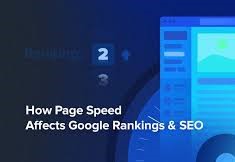In today’s fast-paced digital world, site speed plays a critical role in the success of your website. It’s no longer just about having a beautiful, functional site—how quickly it loads can significantly impact your search engine rankings and user experience. If you’re considering professional help from an SEO company in Delhi or searching for the best SEO company in Delhi, understanding how site speed affects SEO is crucial for your online success.
The Importance of Site Speed in SEO
Site speed refers to the amount of time it takes for a webpage to load entirely. Search engines, particularly Google, factor site speed into their ranking algorithms. The faster your site loads, the better your chances of ranking higher on search engine results pages (SERPs).
Here are a few key reasons why site speed is vital for SEO:
1. User Experience
One of SEO’s main objectives is to improve user experience, which is enhanced by a website that loads quickly. The bounce rate rises when users come on a sluggish website because they are more inclined to depart right away. Google assumes that consumers did not find the information valuable and considers this behavior. A fast website, on the other hand, keeps users interested and motivates them to visit more pages, which improves SEO ranks.
2. Mobile-First Indexing
Google introduced mobile-first indexing since mobile devices account for the bulk of internet traffic. This indicates that Google ranks and indexes websites largely using their mobile version. Site performance is even more important because mobile users may have poorer internet connections than desktop users. You run the danger of alienating potential customers and undermining your SEO efforts if your website loads slowly on mobile devices.
3. Core Web Vitals
Google’s Core Web Vitals are specific metrics that measure the quality of user experience on a website, including site speed. Core Web Vitals focus on three key aspects: Largest Contentful Paint (LCP), First Input Delay (FID), and Cumulative Layout Shift (CLS). LCP, in particular, relates directly to loading speed, and Google prioritizes websites that perform well in these areas.
4. Crawling and Indexing
The frequency and effectiveness of search engine bots crawling your website are also influenced by site speed. The amount of your website that Google can crawl and index in a particular amount of time may be limited by a sluggish site. Fewer pages may be indexed as a result, which may affect how much of your website appears in search results.
In short, optimizing your website’s speed can improve user satisfaction, reduce bounce rates, and boost your SEO rankings. This is where SEO Services in Delhi can be incredibly beneficial for businesses in Delhi, as professionals can ensure that your site is optimized for speed and performance.
How to Improve Site Speed
Now that we’ve covered the importance of site speed for SEO, let’s explore some effective ways to improve it. Whether running a business in Delhi or elsewhere, these methods can help you achieve faster load times and better SEO results.
1. Optimize Images
Large image files can drastically slow down your website. Compressing and resizing images without sacrificing quality is one of the simplest and most effective ways to speed up your site. There are several tools available, like TinyPNG or JPEG Optimizer, that can reduce file sizes without affecting the user experience.
2. Use Browser Caching
Browser caching stores static files such as HTML, CSS, and JavaScript on a visitor’s local device, so they don’t have to be re-downloaded every time they visit your site. By enabling caching, you can significantly reduce load times for returning users. Implementing caching rules via your website’s .htaccess file can be beneficial for site speed.
3. Minify CSS, JavaScript, and HTML
Every additional line of code in your CSS, JavaScript, or HTML can slow down your website. Minifying these files involves removing unnecessary spaces, commas, and other elements that aren’t required for the code to function properly. Tools like CSS Minifier or JavaScript Minifier can help you streamline these files, improving overall site speed.
4. Leverage Content Delivery Networks (CDNs)
A content delivery network, or CDN, is a worldwide network of computers that holds duplicates of the static material on your website. The server nearest to the user’s location serves the content when they visit your website, cutting down on latency and load times. Websites with a large traffic volume or those catering to a worldwide audience particularly benefit from CDNs. CDN solutions are available from services like Cloudflare and Amazon CloudFront, which may significantly increase site performance.
5. Enable Gzip Compression
Gzip is a file compression method that can reduce the size of your website’s files, making them load faster for visitors. Gzip can compress HTML, CSS, and JavaScript files, reducing the overall load time. You can enable Gzip compression on your web server through settings or plugins depending on your platform.
6. Reduce HTTP Requests
Each time a user visits your site, their browser makes requests to your server for various elements like images, scripts, and stylesheets. Reducing the number of HTTP requests can dramatically improve load times. Combine multiple files into one when possible, and eliminate unnecessary plugins or third-party services that add extra requests.
7. Choose a Reliable Hosting Provider
The speed of your website is mostly determined by your host. Although shared hosting could be less expensive, it may result in slower load times, particularly during periods of high traffic. To get faster and more efficient hosting, think about moving to a dedicated server or cloud-based hosting package. You may choose the ideal hosting company for your website needs with the help of several SEO companies in Delhi.
8. Monitor Site Performance Regularly
Site speed can fluctuate over time as you add more content, features, and functionalities. Regularly monitoring your site’s performance ensures that you catch any slowdowns early. Tools like Google PageSpeed Insights and GTMetrix provide detailed reports on your site’s speed and offer actionable suggestions for improvement.
Conclusion
Site speed is an essential factor that can make or break your SEO strategy. From improving user experience to meeting Google’s Core Web Vitals, faster loading times are critical for your website’s success. Investing in professional SEO Services in Delhi can help ensure that your site meets these speed standards, boosting your rankings and improving user engagement.



